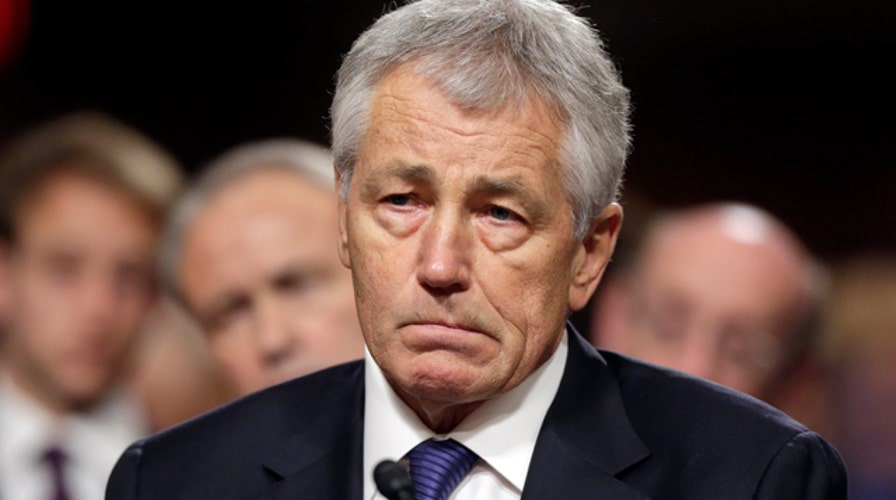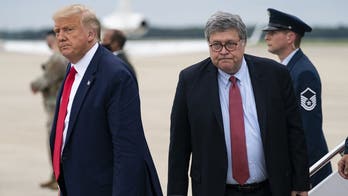Power Play 2/1/2013
Hagel's horrible day. Will Congress duck sequester? And enforcement debate could stall immigration deal.
“These are the indicators of crisis, subject to data and statistics. Less measurable, but no less profound, is a sapping of confidence across our land; a nagging fear that America's decline is inevitable, that the next generation must lower its sights.”
-- President Obama in his first inaugural address, Jan. 20, 2009, discussing high unemployment, poor economic performance and other worrisome signs.
There were about 200,000 more people looking for work this January than four years ago when President Obama first took the oath of office.
There are about 400,000 more folks who have given up looking for work or who have been forced to take part-time jobs.
Now, compared to the days of economic catastrophe that would follow as Americans absorbed the blow of the Panic of 2008, having 22.7 million Americans on the economic sidelines doesn’t look so bad.
Remember that just a year after Obama took the office, people were happy to see the top-line unemployment rate finally fall below 10 percent.
And Democrats will today herald the latest jobs report, saying it shows how millions of new jobs have been added over the past four years thanks to stimulus spending, etc. The unemployment rate may be a tenth of a point higher today than it was in 2009, but Democrats will say, as the president said in his second inaugural address, that a recovery has begun.
They will also go a step further and say job growth would be rocking and rolling if it weren’t for Republicans who refuse to allow increased borrowing in order to finance additional stimulus spending.
But the story of the last four years on jobs is mostly about the incredible shrinking American workforce.
While we can be glad an estimated 157,000 people found jobs in January, another 169,000 people dropped out of the workforce.
The overall workforce participation rate, that is to say the number of able-bodied adults in the job market, is two points lower than when Obama took office, and still hovering at the same levels as the early 1980s when we saw full female integration in the workforce.
If the workforce participation rate were the same as it was when Obama took office, the January unemployment rate would be 10.44 percent.
So where did the workers go?
Some Baby Boomers certainly retired early. And some moms opted to stay at home rather than trying to find work outside. Some people opted to go back to school. And some folks found themselves undesirable hires after two years of unemployment, drifting from temporary government assistance to permanent.
But the undeniable trend is that our workforce is smaller and older than it was four years ago as Americans see their hopes for retirement fade with lower wages.
As Tyler Durden points out at Zero Hedge, in Obama’s first term, 2.7 million jobs were lost among workers ages 16 to 55 while some 4 million jobs were added among Americans over 55. It’s a net gain, but not an encouraging sign.
Consider this: The unemployment rate for Americans aged 18 to 29 in January was 13.1 percent, 16.2 percent including those who had dropped out.
This shift holds generational consequences as younger workers fail to gain skills and earning power for later years. While there is good news for entitlement programs since the weak jobs market and clinging older workers have pushed back some of the burden on the insolvent Medicare and Social Security programs, the long-term outlook is unhappy.
As Americans wait longer to retire and the ranks of the job-market dropouts fill with young, able-bodied adults we see a day in the not-too-distant future when the demographic tsunami swamps the nation. When the oldsters do finally retire there will be a major gap in the employment levels and earnings of the younger workers tasked with supporting them in old age through tax payments.
Four years ago, Obama said that younger Americans wouldn’t need to lower their sights, but that seems to be exactly what they have done.
And Now, A Word From Charles
“What happened [in former Sen. Chuck Hagel’s confirmation hearing] was shocking because it showed an astonishing lack of competence. He was wobbly, weak and fumbling.”
-- Charles Krauthammer on “Special Report with Bret Baier.”
Chris Stirewalt is digital politics editor for Fox News, and his POWER PLAY column appears Monday-Friday on FoxNews.com. Catch Chris Live online daily at 11:30amET at http:live.foxnews.com.





